Marshall Hodgson. Rethinking World History: Essays on Europe, Islam and World History
Подождите немного. Документ загружается.

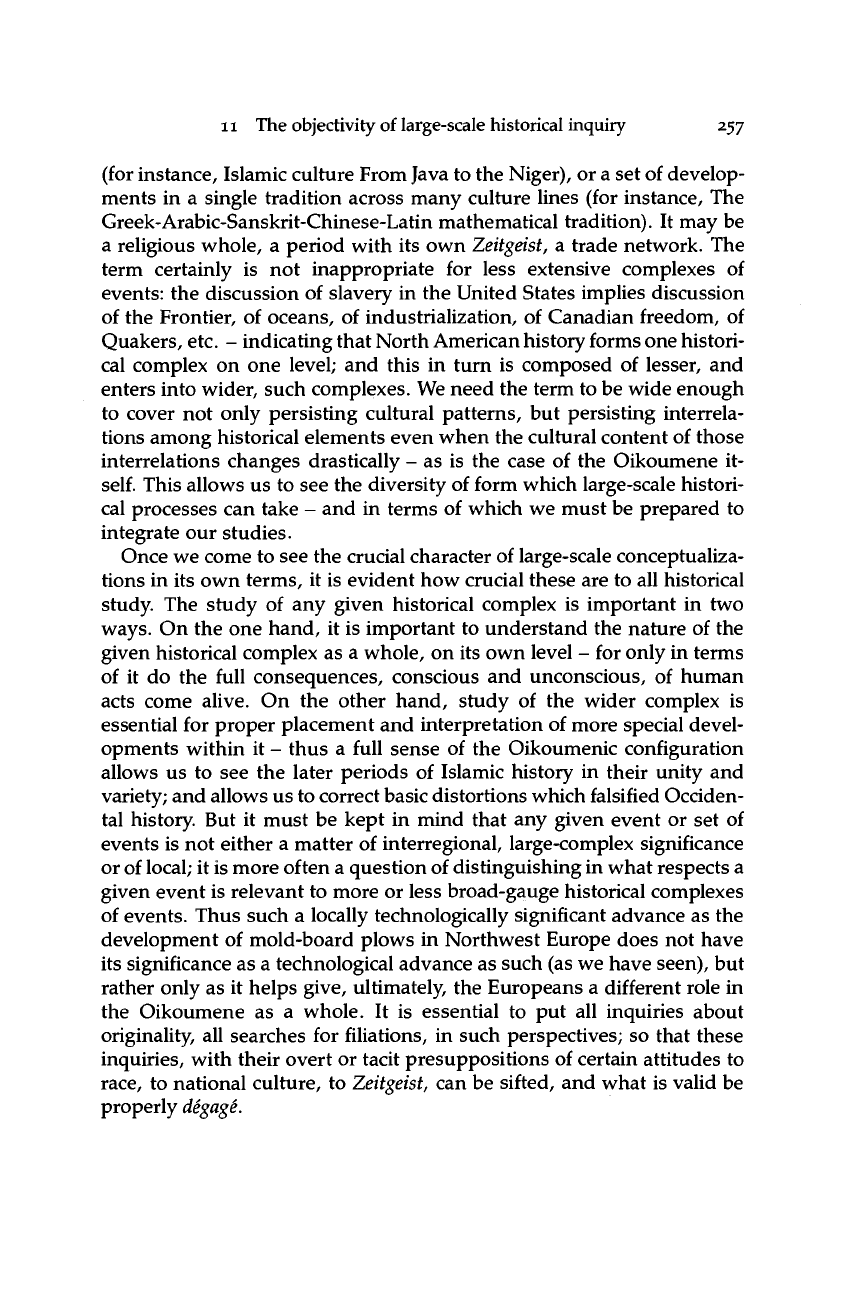
ii The objectivity of large-scale historical inquiry 257
(for instance, Islamic culture From Java to the Niger), or a set of develop-
ments in a single tradition across many culture lines (for instance, The
Greek-Arabic-Sanskrit-Chinese-Latin mathematical tradition). It may be
a religious whole, a period with its own
Zeitgeist,
a trade network. The
term certainly is not inappropriate for less extensive complexes of
events: the discussion of slavery in the United States implies discussion
of the Frontier, of oceans, of industrialization, of Canadian freedom, of
Quakers, etc. - indicating that North American history forms one histori-
cal complex on one level; and this in turn is composed of lesser, and
enters into wider, such complexes. We need the term to be wide enough
to cover not only persisting cultural patterns, but persisting interrela-
tions among historical elements even when the cultural content of those
interrelations changes drastically - as is the case of the Oikoumene it-
self.
This allows us to see the diversity of form which large-scale histori-
cal processes can take - and in terms of which we must be prepared to
integrate our studies.
Once we come to see the crucial character of large-scale conceptualiza-
tions in its own terms, it is evident how crucial these are to all historical
study. The study of any given historical complex is important in two
ways.
On the one hand, it is important to understand the nature of the
given historical complex as a whole, on its own level - for only in terms
of it do the full consequences, conscious and unconscious, of human
acts come alive. On the other hand, study of the wider complex is
essential for proper placement and interpretation of more special devel-
opments within it - thus a full sense of the Oikoumenic configuration
allows us to see the later periods of Islamic history in their unity and
variety; and allows us to correct basic distortions which falsified Occiden-
tal history. But it must be kept in mind that any given event or set of
events is not either a matter of interregional, large-complex significance
or of
local;
it is more often a question of distinguishing in what respects a
given event is relevant to more or less broad-gauge historical complexes
of events. Thus such a locally technologically significant advance as the
development of mold-board plows in Northwest Europe does not have
its significance as a technological advance as such (as we have seen), but
rather only as it helps give, ultimately, the Europeans a different role in
the Oikoumene as a whole. It is essential to put all inquiries about
originality, all searches for filiations, in such perspectives; so that these
inquiries, with their overt or tacit presuppositions of certain attitudes to
race,
to national culture, to
Zeitgeist,
can be sifted, and what is valid be
properly
degage.
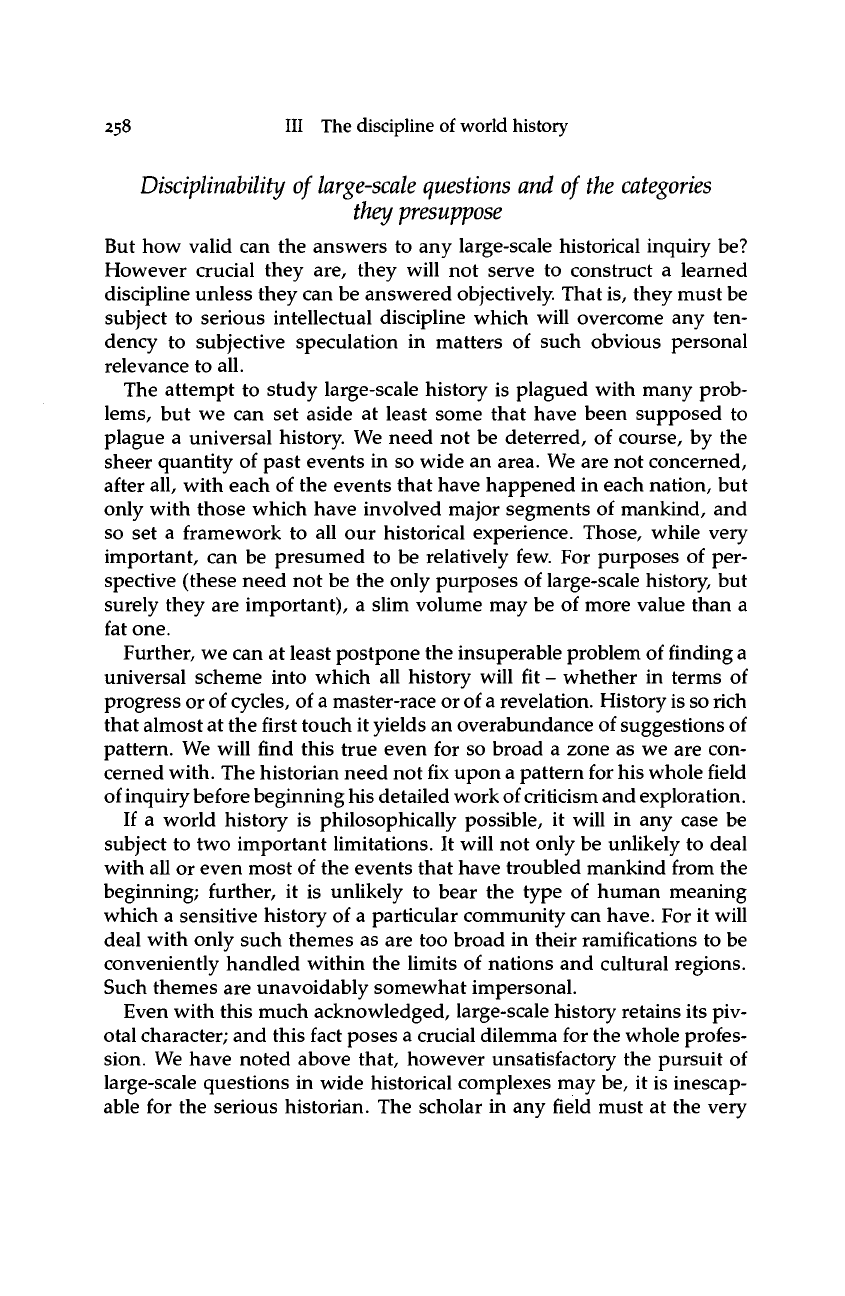
258 III The discipline of world history
Disciplinability of
large-scale
questions and of the
categories
they
presuppose
But how valid can the answers to any large-scale historical inquiry be?
However crucial they are, they will not serve to construct a learned
discipline unless they can be answered objectively. That
is,
they must be
subject to serious intellectual discipline which will overcome any ten-
dency to subjective speculation in matters of such obvious personal
relevance to all.
The attempt to study large-scale history is plagued with many prob-
lems,
but we can set aside at least some that have been supposed to
plague a universal history. We need not be deterred, of course, by the
sheer quantity of past events in so wide an area. We are not concerned,
after all, with each of the events that have happened in each nation, but
only with those which have involved major segments of mankind, and
so set a framework to all our historical experience. Those, while very
important, can be presumed to be relatively few. For purposes of per-
spective (these need not be the only purposes of large-scale history, but
surely they are important), a slim volume may be of more value than a
fat one.
Further, we can at least postpone the insuperable problem of finding a
universal scheme into which all history will fit - whether in terms of
progress or of
cycles,
of a master-race or of
a
revelation. History is so rich
that almost at the first touch it yields an overabundance of suggestions of
pattern. We will find this true even for so broad a zone as we are con-
cerned with. The historian need not fix upon a pattern for his whole field
of inquiry before beginning his detailed work of criticism and exploration.
If a world history is philosophically possible, it will in any case be
subject to two important limitations. It will not only be unlikely to deal
with all or even most of the events that have troubled mankind from the
beginning; further, it is unlikely to bear the type of human meaning
which a sensitive history of a particular community can have. For it will
deal with only such themes as are too broad in their ramifications to be
conveniently handled within the limits of nations and cultural regions.
Such themes are unavoidably somewhat impersonal.
Even with this much acknowledged, large-scale history retains its piv-
otal character; and this fact poses a crucial dilemma for the whole profes-
sion. We have noted above that, however unsatisfactory the pursuit of
large-scale questions in wide historical complexes may be, it is inescap-
able for the serious historian. The scholar in any field must at the very
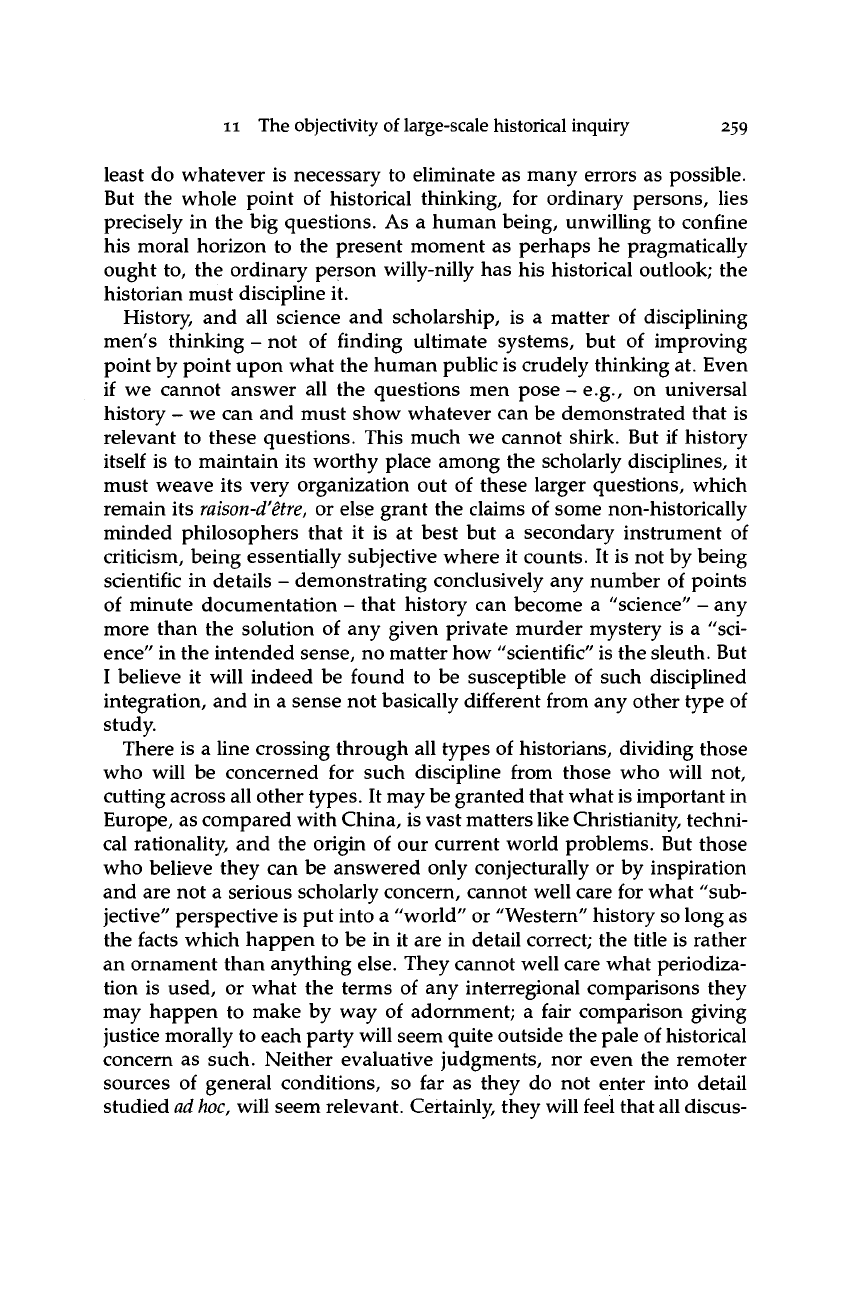
ii The objectivity of large-scale historical inquiry 259
least do whatever is necessary to eliminate as many errors as possible.
But the whole point of historical thinking, for ordinary persons, lies
precisely in the big questions. As a human being, unwilling to confine
his moral horizon to the present moment as perhaps he pragmatically
ought to, the ordinary person willy-nilly has his historical outlook; the
historian must discipline it.
History, and all science and scholarship, is a matter of disciplining
men's thinking - not of finding ultimate systems, but of improving
point by point upon what the human public is crudely thinking at. Even
if we cannot answer all the questions men pose - e.g., on universal
history - we can and must show whatever can be demonstrated that is
relevant to these questions. This much we cannot shirk. But if history
itself is to maintain its worthy place among the scholarly disciplines, it
must weave its very organization out of these larger questions, which
remain its
raison-d'etre,
or else grant the claims of some non-historically
minded philosophers that it is at best but a secondary instrument of
criticism, being essentially subjective where it counts. It is not by being
scientific in details - demonstrating conclusively any number of points
of minute documentation - that history can become a "science" - any
more than the solution of any given private murder mystery is a "sci-
ence"
in the intended sense, no matter how "scientific" is the sleuth. But
I believe it will indeed be found to be susceptible of such disciplined
integration, and in a sense not basically different from any other type of
study.
There is a line crossing through all types of historians, dividing those
who will be concerned for such discipline from those who will not,
cutting across all other types. It may be granted that what is important in
Europe, as compared with China, is vast matters like Christianity, techni-
cal rationality, and the origin of our current world problems. But those
who believe they can be answered only conjecturally or by inspiration
and are not a serious scholarly concern, cannot well care for what "sub-
jective" perspective is put into a "world" or "Western" history so long as
the facts which happen to be in it are in detail correct; the title is rather
an ornament than anything else. They cannot well care what periodiza-
tion is used, or what the terms of any interregional comparisons they
may happen to make by way of adornment; a fair comparison giving
justice morally to each party will seem quite outside the pale of historical
concern as such. Neither evaluative judgments, nor even the remoter
sources of general conditions, so far as they do not enter into detail
studied
ad
hoc,
will seem relevant. Certainly, they will feel that all discus-
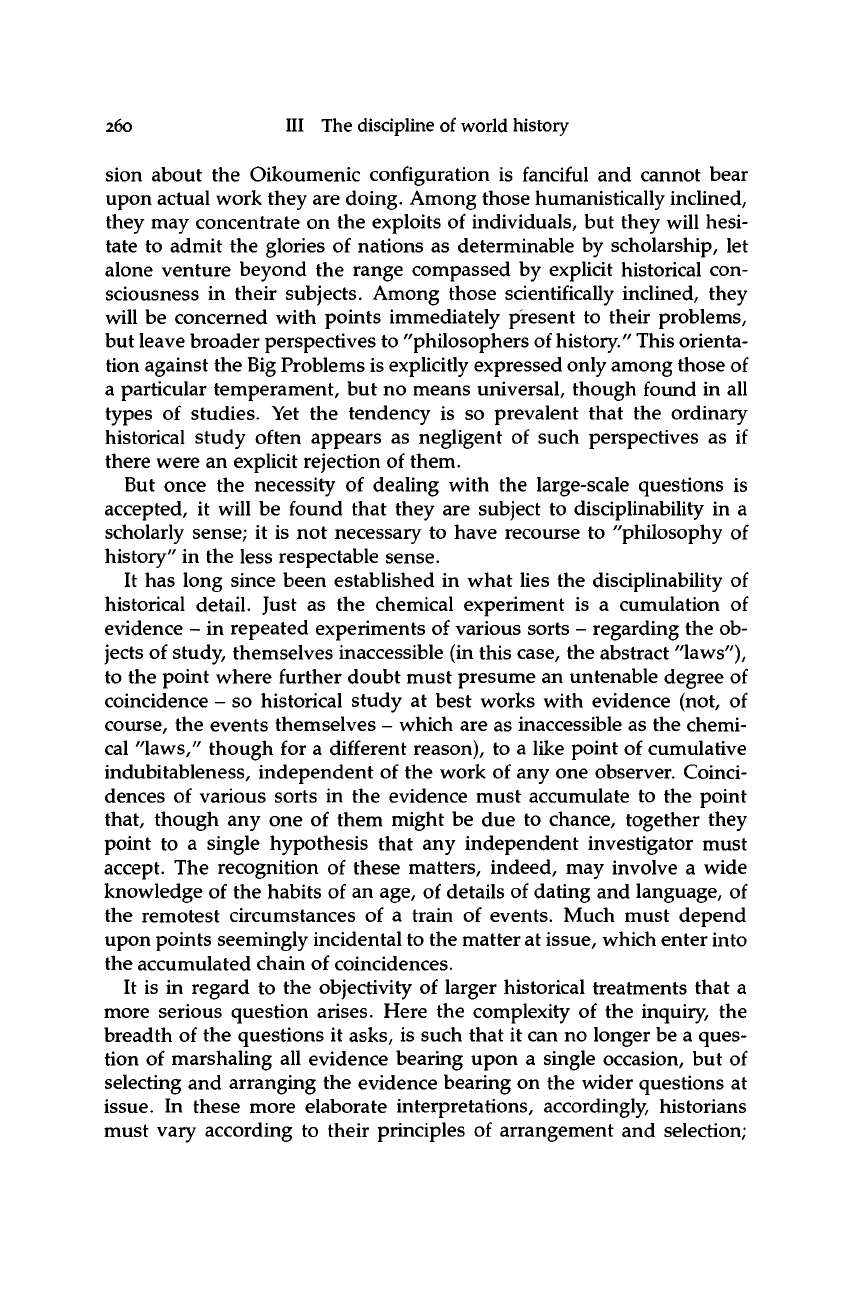
260 III The discipline of world history
sion about
the
Oikoumenic configuration
is
fanciful
and
cannot bear
upon actual work they are doing. Among those humanistically inclined,
they
may
concentrate
on the
exploits
of
individuals,
but
they will hesi-
tate
to
admit
the
glories
of
nations
as
determinable
by
scholarship,
let
alone venture beyond
the
range compassed
by
explicit historical
con-
sciousness
in
their subjects. Among those scientifically inclined, they
will
be
concerned with points immediately present
to
their problems,
but leave broader perspectives
to
"philosophers
of
history." This orienta-
tion against
the
Big Problems is explicitly expressed only among those of
a particular temperament,
but no
means universal, though found
in all
types
of
studies.
Yet the
tendency
is so
prevalent that
the
ordinary
historical study often appears
as
negligent
of
such perspectives
as if
there were
an
explicit rejection
of
them.
But once
the
necessity
of
dealing with
the
large-scale questions
is
accepted,
it
will
be
found that they
are
subject
to
disciplinability
in a
scholarly sense;
it is not
necessary
to
have recourse
to
"philosophy
of
history"
in the
less respectable sense.
It
has
long since been established
in
what lies
the
disciplinability
of
historical detail. Just
as the
chemical experiment
is a
cumulation
of
evidence
- in
repeated experiments
of
various sorts
-
regarding
the ob-
jects
of
study, themselves inaccessible
(in
this case,
the
abstract "laws"),
to
the
point where further doubt must presume
an
untenable degree
of
coincidence
- so
historical study
at
best works with evidence
(not, of
course,
the
events themselves
-
which
are as
inaccessible
as the
chemi-
cal "laws," though
for a
different reason),
to a
like point
of
cumulative
indubitableness, independent
of the
work
of any one
observer. Coinci-
dences
of
various sorts
in the
evidence must accumulate
to the
point
that, though
any one of
them might
be due to
chance, together they
point
to a
single hypothesis that
any
independent investigator must
accept.
The
recognition
of
these matters, indeed,
may
involve
a
wide
knowledge
of the
habits
of an
age,
of
details
of
dating
and
language,
of
the remotest circumstances
of a
train
of
events. Much must depend
upon points seemingly incidental
to the
matter
at
issue, which enter into
the accumulated chain
of
coincidences.
It
is in
regard
to the
objectivity
of
larger historical treatments that
a
more serious question arises. Here
the
complexity
of the
inquiry,
the
breadth
of the
questions
it
asks,
is
such that
it can no
longer
be a
ques-
tion
of
marshaling
all
evidence bearing upon
a
single occasion,
but of
selecting
and
arranging
the
evidence bearing
on the
wider questions
at
issue.
In
these more elaborate interpretations, accordingly, historians
must vary according
to
their principles
of
arrangement
and
selection;
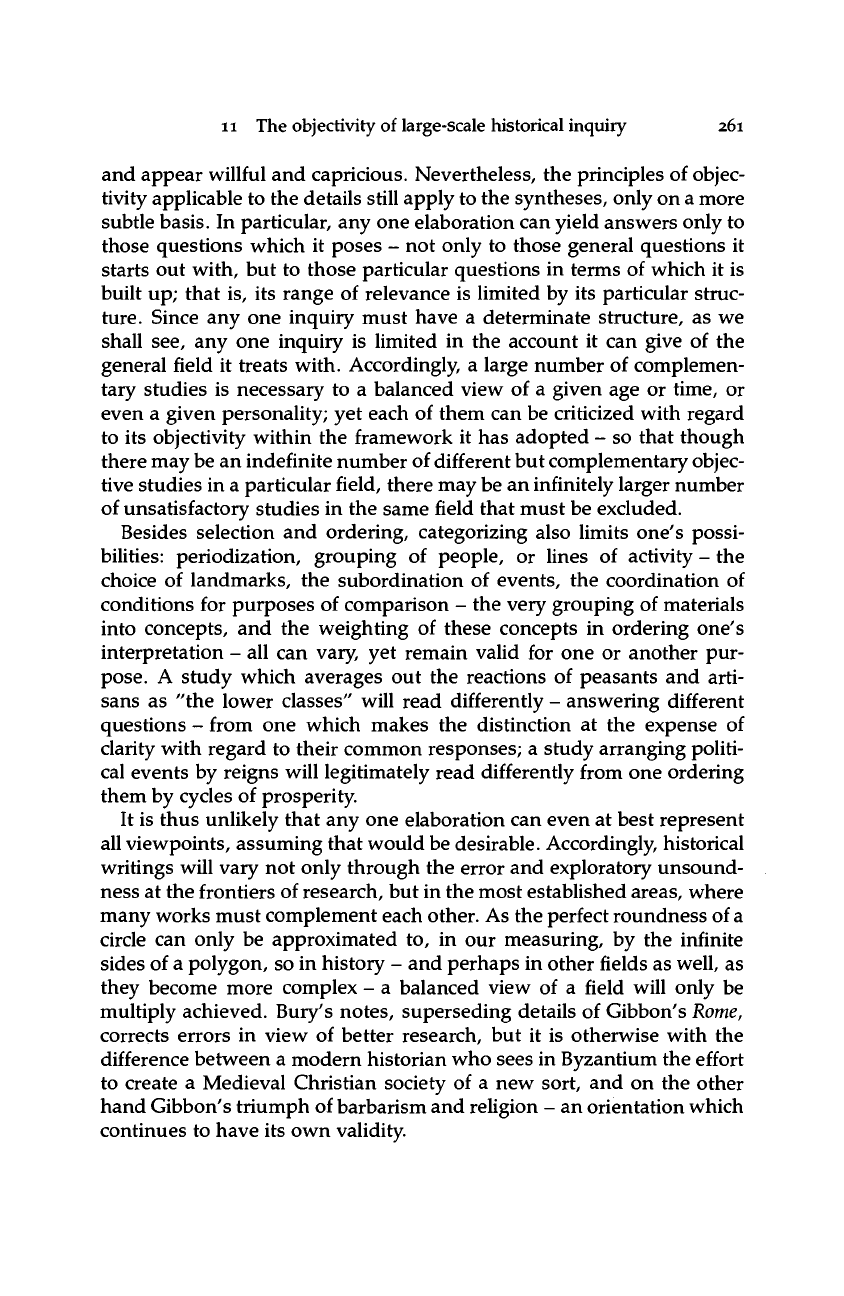
ii The objectivity of large-scale historical inquiry 261
and appear willful and capricious. Nevertheless, the principles of objec-
tivity applicable to the details still apply to the syntheses, only on a more
subtle basis. In particular, any one elaboration can yield answers only to
those questions which it poses - not only to those general questions it
starts out with, but to those particular questions in terms of which it is
built up; that is, its range of relevance is limited by its particular struc-
ture.
Since any one inquiry must have a determinate structure, as we
shall see, any one inquiry is limited in the account it can give of the
general field it treats with. Accordingly, a large number of complemen-
tary studies is necessary to a balanced view of a given age or time, or
even a given personality; yet each of them can be criticized with regard
to its objectivity within the framework it has adopted - so that though
there may be an indefinite number of different but complementary objec-
tive studies in a particular field, there may be an infinitely larger number
of unsatisfactory studies in the same field that must be excluded.
Besides selection and ordering, categorizing also limits one's possi-
bilities: periodization, grouping of people, or lines of activity - the
choice of landmarks, the subordination of events, the coordination of
conditions for purposes of comparison - the very grouping of materials
into concepts, and the weighting of these concepts in ordering one's
interpretation - all can vary, yet remain valid for one or another pur-
pose.
A study which averages out the reactions of peasants and arti-
sans as "the lower classes" will read differently - answering different
questions - from one which makes the distinction at the expense of
clarity with regard to their common responses; a study arranging politi-
cal events by reigns will legitimately read differently from one ordering
them by cycles of prosperity.
It is thus unlikely that any one elaboration can even at best represent
all viewpoints, assuming that would be desirable. Accordingly, historical
writings will vary not only through the error and exploratory unsound-
ness at the frontiers of research, but in the most established areas, where
many works must complement each other. As the perfect roundness of a
circle can only be approximated to, in our measuring, by the infinite
sides of a polygon, so in history - and perhaps in other fields as well, as
they become more complex - a balanced view of a field will only be
multiply achieved. Bury's notes, superseding details of Gibbon's Rome,
corrects errors in view of better research, but it is otherwise with the
difference between a modern historian who sees in Byzantium the effort
to create a Medieval Christian society of a new sort, and on the other
hand Gibbon's triumph of barbarism and religion - an orientation which
continues to have its own validity.
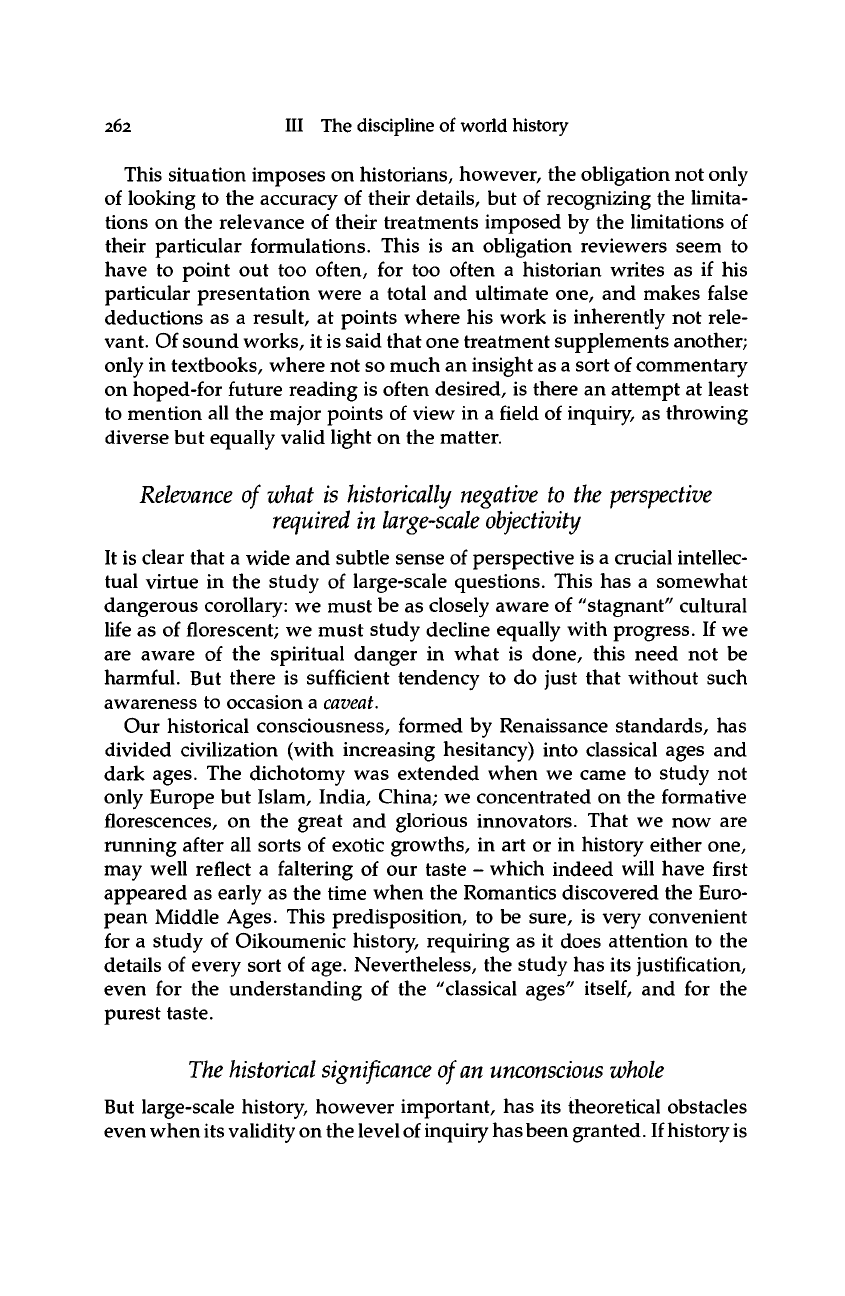
262 III The discipline of world history
This situation imposes
on
historians, however,
the
obligation
not
only
of looking
to the
accuracy
of
their details,
but of
recognizing
the
limita-
tions
on the
relevance
of
their treatments imposed
by the
limitations
of
their particular formulations. This
is an
obligation reviewers seem
to
have
to
point
out too
often,
for too
often
a
historian writes
as if his
particular presentation were
a
total
and
ultimate
one, and
makes false
deductions
as a
result,
at
points where
his
work
is
inherently
not
rele-
vant.
Of
sound works,
it
is said that one treatment supplements another;
only
in
textbooks, where
not
so much
an
insight as
a
sort
of
commentary
on hoped-for future reading
is
often desired,
is
there
an
attempt
at
least
to mention
all the
major points
of
view
in a
field
of
inquiry,
as
throwing
diverse
but
equally valid light
on the
matter.
Relevance
of
what
is
historically negative
to the
perspective
required
in
large-scale objectivity
It
is
clear that
a
wide
and
subtle sense
of
perspective
is a
crucial intellec-
tual virtue
in the
study
of
large-scale questions. This
has a
somewhat
dangerous corollary:
we
must
be as
closely aware
of
"stagnant" cultural
life
as of
florescent;
we
must study decline equally with progress.
If we
are aware
of the
spiritual danger
in
what
is
done, this need
not be
harmful.
But
there
is
sufficient tendency
to do
just that without such
awareness
to
occasion
a
caveat.
Our historical consciousness, formed
by
Renaissance standards,
has
divided civilization (with increasing hesitancy) into classical ages
and
dark ages.
The
dichotomy
was
extended when
we
came
to
study
not
only Europe
but
Islam, India, China;
we
concentrated
on the
formative
florescences,
on the
great
and
glorious innovators. That
we now are
running after
all
sorts
of
exotic growths,
in art or in
history either
one,
may well reflect
a
faltering
of our
taste
-
which indeed will have first
appeared
as
early
as the
time when
the
Romantics discovered
the
Euro-
pean Middle Ages. This predisposition,
to be
sure,
is
very convenient
for
a
study
of
Oikoumenic history, requiring
as it
does attention
to the
details
of
every sort
of
age. Nevertheless,
the
study
has its
justification,
even
for the
understanding
of the
"classical ages"
itself, and for the
purest taste.
The
historical significance
of an
unconscious
whole
But large-scale history, however important,
has its
theoretical obstacles
even when
its
validity on the level of inquiry has been granted. If history is
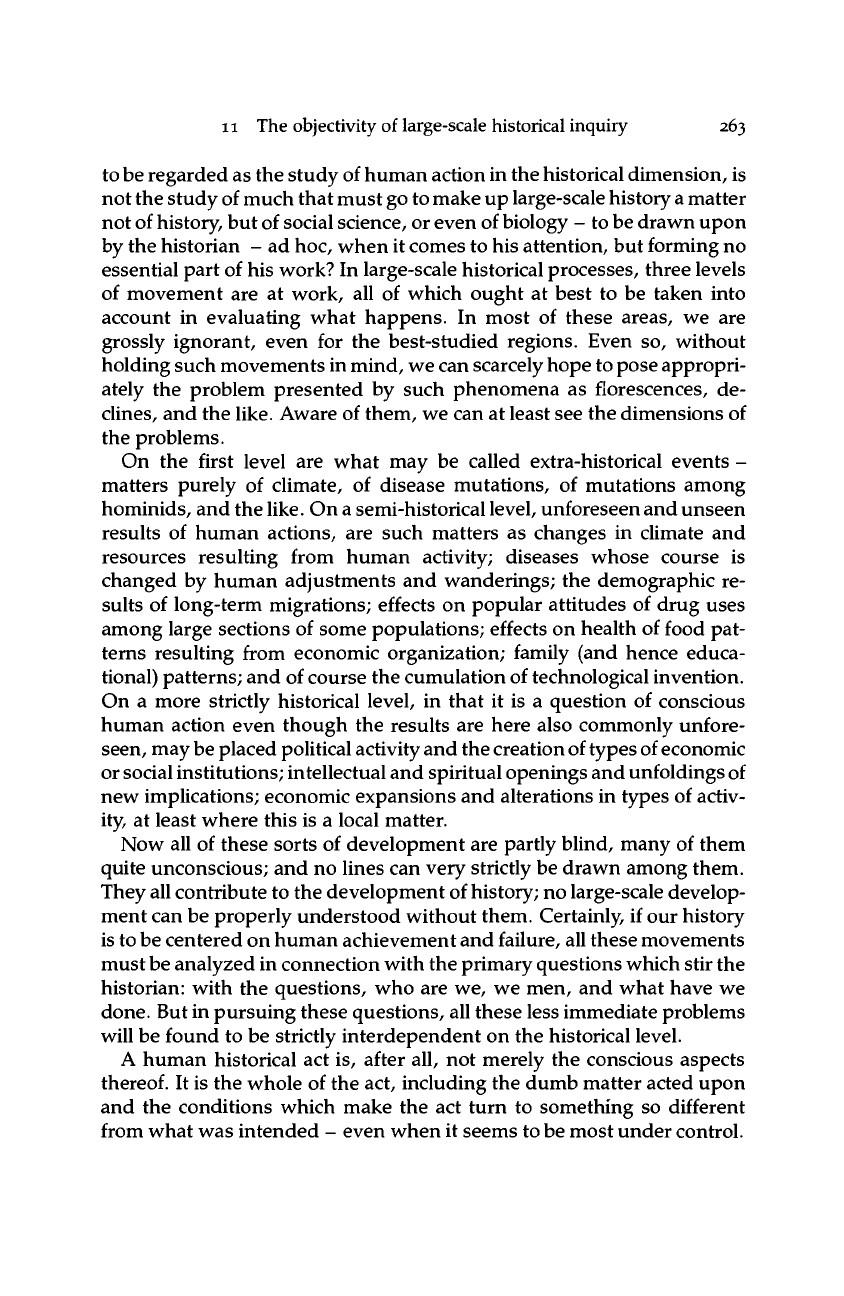
ii The objectivity of large-scale historical inquiry 263
to be regarded as the study of human action in the historical dimension, is
not the study of much that must
go
to make up large-scale history
a
matter
not of history, but of social science, or even of biology - to be drawn upon
by the historian - ad hoc, when it comes to his attention, but forming no
essential part of his work? In large-scale historical processes, three levels
of movement are at work, all of which ought at best to be taken into
account in evaluating what happens. In most of these areas, we are
grossly ignorant, even for the best-studied regions. Even so, without
holding such movements in mind, we can scarcely hope to pose appropri-
ately the problem presented by such phenomena as florescences, de-
clines,
and the like. Aware of them, we can at least see the dimensions of
the problems.
On the first level are what may be called extra-historical events -
matters purely of climate, of disease mutations, of mutations among
hominids, and the
like.
On
a
semi-historical
level,
unforeseen and unseen
results of human actions, are such matters as changes in climate and
resources resulting from human activity; diseases whose course is
changed by human adjustments and wanderings; the demographic re-
sults of long-term migrations; effects on popular attitudes of drug uses
among large sections of some populations; effects on health of food pat-
terns resulting from economic organization; family (and hence educa-
tional) patterns; and of course the cumulation of technological invention.
On a more strictly historical level, in that it is a question of conscious
human action even though the results are here also commonly unfore-
seen, may
be
placed political activity and the creation of types of economic
or social institutions; intellectual and spiritual openings and unfoldings
of
new implications; economic expansions and alterations in types of activ-
ity, at least where this is a local matter.
Now all of these sorts of development are partly blind, many of them
quite unconscious; and no lines can very strictly be drawn among them.
They all contribute to the development of history; no large-scale develop-
ment can be properly understood without them. Certainly, if our history
is to be centered on human achievement and failure, all these movements
must be analyzed in connection with the primary questions which stir the
historian: with the questions, who are we, we men, and what have we
done. But in pursuing these questions, all these less immediate problems
will be found to be strictly interdependent on the historical level.
A human historical act is, after all, not merely the conscious aspects
thereof.
It is the whole of the act, including the dumb matter acted upon
and the conditions which make the act turn to something so different
from what was intended - even when it seems to be most under control.
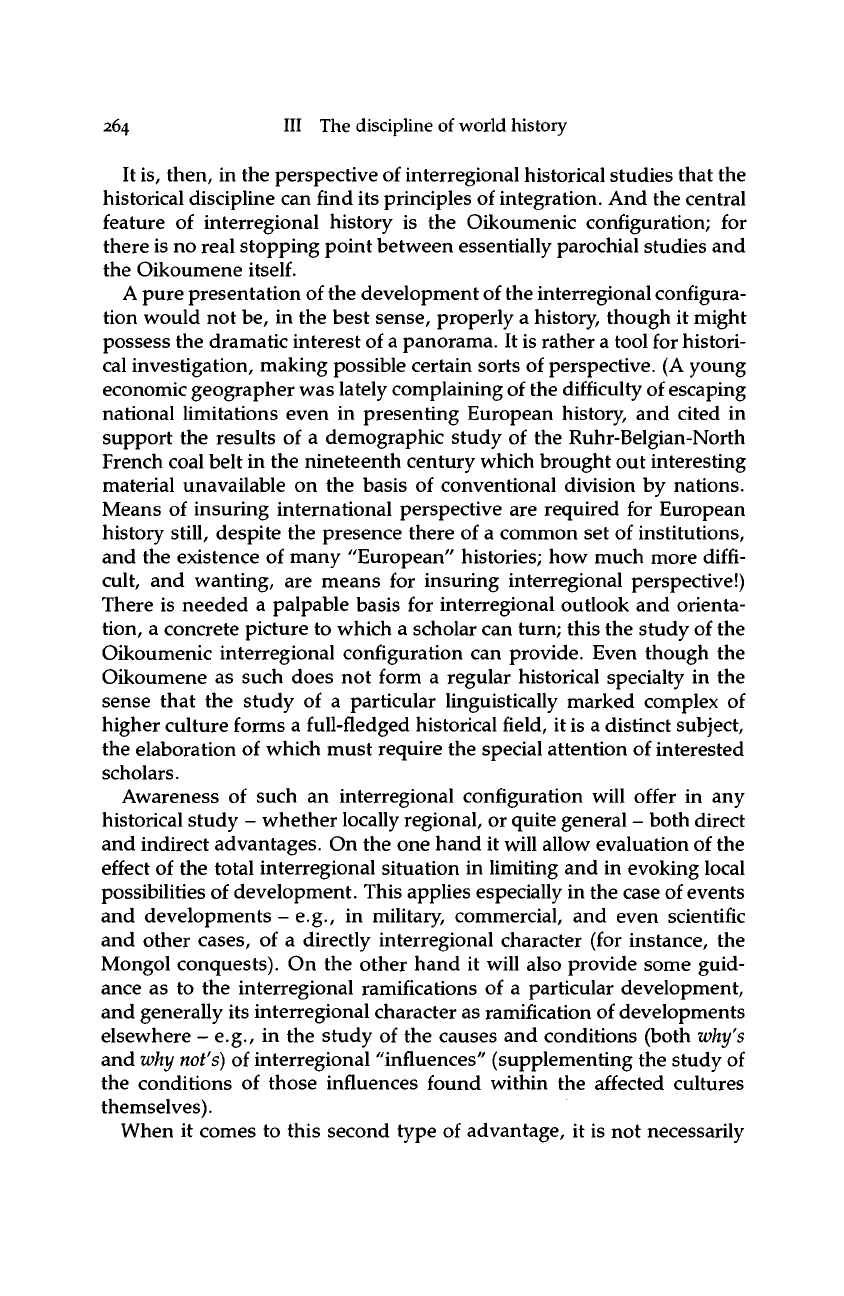
264 III The discipline of world history
It is, then, in the perspective of interregional historical studies that the
historical discipline can find its principles of integration. And the central
feature of interregional history is the Oikoumenic configuration; for
there is no real stopping point between essentially parochial studies and
the Oikoumene
itself.
A pure presentation of the development of the interregional configura-
tion would not be, in the best sense, properly a history, though it might
possess the dramatic interest of a panorama. It is rather a tool for histori-
cal investigation, making possible certain sorts of perspective. (A young
economic geographer was lately complaining of the difficulty of escaping
national limitations even in presenting European history, and cited in
support the results of a demographic study of the Ruhr-Belgian-North
French coal belt in the nineteenth century which brought out interesting
material unavailable on the basis of conventional division by nations.
Means of insuring international perspective are required for European
history still, despite the presence there of a common set of institutions,
and the existence of many "European" histories; how much more diffi-
cult, and wanting, are means for insuring interregional perspective!)
There is needed a palpable basis for interregional outlook and orienta-
tion, a concrete picture to which a scholar can turn; this the study of the
Oikoumenic interregional configuration can provide. Even though the
Oikoumene as such does not form a regular historical specialty in the
sense that the study of a particular linguistically marked complex of
higher culture forms a full-fledged historical field, it is a distinct subject,
the elaboration of which must require the special attention of interested
scholars.
Awareness of such an interregional configuration will offer in any
historical study - whether locally regional, or quite general - both direct
and indirect advantages. On the one hand it will allow evaluation of the
effect of the total interregional situation in limiting and in evoking local
possibilities of development. This applies especially in the case of events
and developments - e.g., in military, commercial, and even scientific
and other cases, of a directly interregional character (for instance, the
Mongol conquests). On the other hand it will also provide some guid-
ance as to the interregional ramifications of a particular development,
and generally its interregional character as ramification of developments
elsewhere - e.g., in the study of the causes and conditions (both why's
and why not's) of interregional "influences" (supplementing the study of
the conditions of those influences found within the affected cultures
themselves).
When it comes to this second type of advantage, it is not necessarily
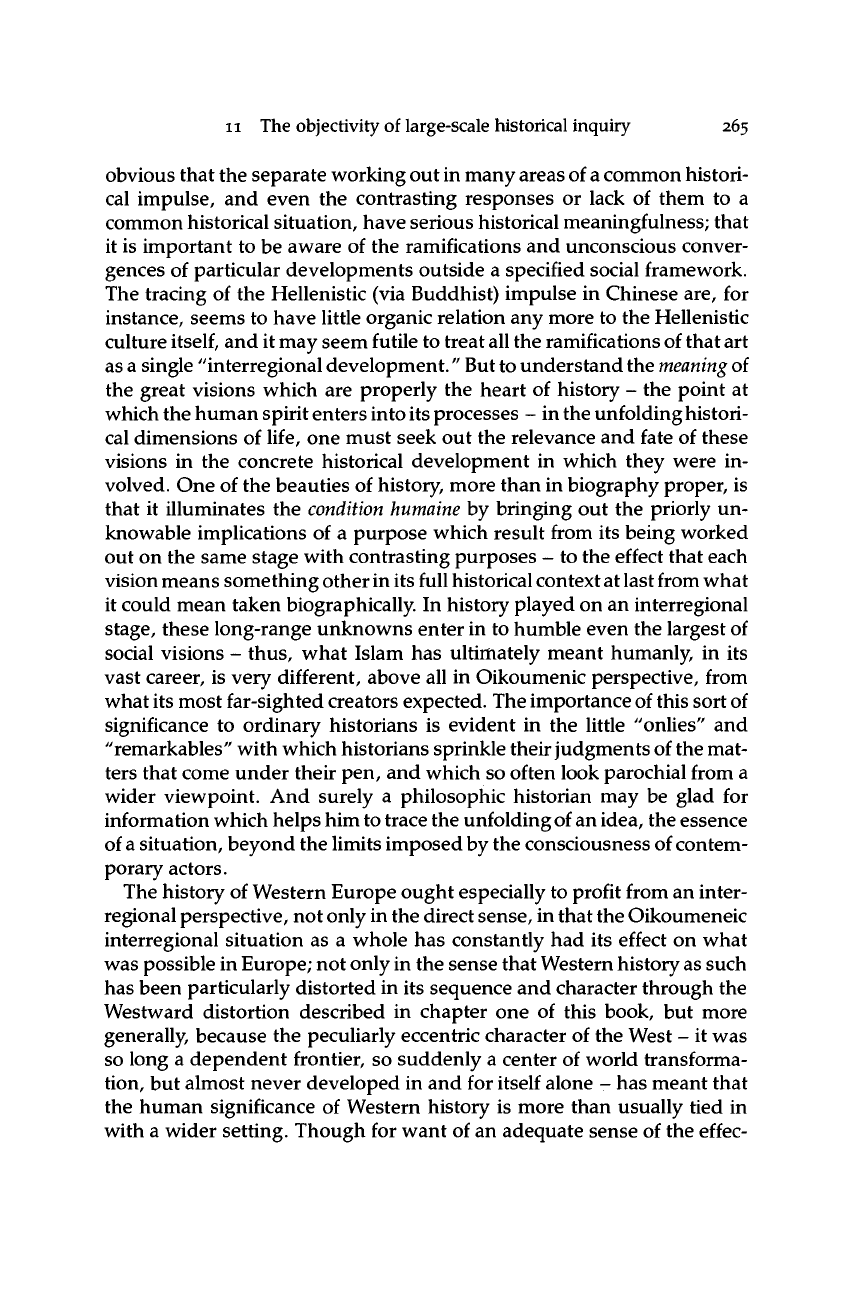
ii The objectivity of large-scale historical inquiry 265
obvious that the separate working out in many areas of
a
common histori-
cal impulse, and even the contrasting responses or lack of them to a
common historical situation, have serious historical meaningfulness; that
it is important to be aware of the ramifications and unconscious conver-
gences of particular developments outside a specified social framework.
The tracing of the Hellenistic (via Buddhist) impulse in Chinese are, for
instance, seems to have little organic relation any more to the Hellenistic
culture
itself,
and it may seem futile to treat all the ramifications of that art
as a single "interregional development." But to understand the
meaning of
the great visions which are properly the heart of history - the point at
which the human spirit enters into
its
processes - in the unfolding histori-
cal dimensions of life, one must seek out the relevance and fate of these
visions in the concrete historical development in which they were in-
volved. One of the beauties of history, more than in biography proper, is
that it illuminates the
condition humaine
by bringing out the priorly un-
knowable implications of a purpose which result from its being worked
out on the same stage with contrasting purposes - to the effect that each
vision means something other in
its
full historical context at last from what
it could mean taken biographically. In history played on an interregional
stage, these long-range unknowns enter in to humble even the largest of
social visions - thus, what Islam has ultimately meant humanly, in its
vast career, is very different, above all in Oikoumenic perspective, from
what its most far-sighted creators expected. The importance of this sort
of
significance to ordinary historians is evident in the little "onlies" and
"remarkables" with which historians sprinkle their judgments of the mat-
ters that come under their pen, and which so often look parochial from a
wider viewpoint. And surely a philosophic historian may be glad for
information which helps him to trace the unfolding of an
idea,
the essence
of
a
situation, beyond the limits imposed by the consciousness of contem-
porary actors.
The history of Western Europe ought especially to profit from an inter-
regional perspective, not only in the direct
sense,
in that the Oikoumeneic
interregional situation as a whole has constantly had its effect on what
was possible in Europe; not only in the sense that Western history as such
has been particularly distorted in its sequence and character through the
Westward distortion described in chapter one of this book, but more
generally, because the peculiarly eccentric character of the West - it was
so long a dependent frontier, so suddenly a center of world transforma-
tion, but almost never developed in and for itself alone - has meant that
the human significance of Western history is more than usually tied in
with a wider setting. Though for want of an adequate sense of the effec-
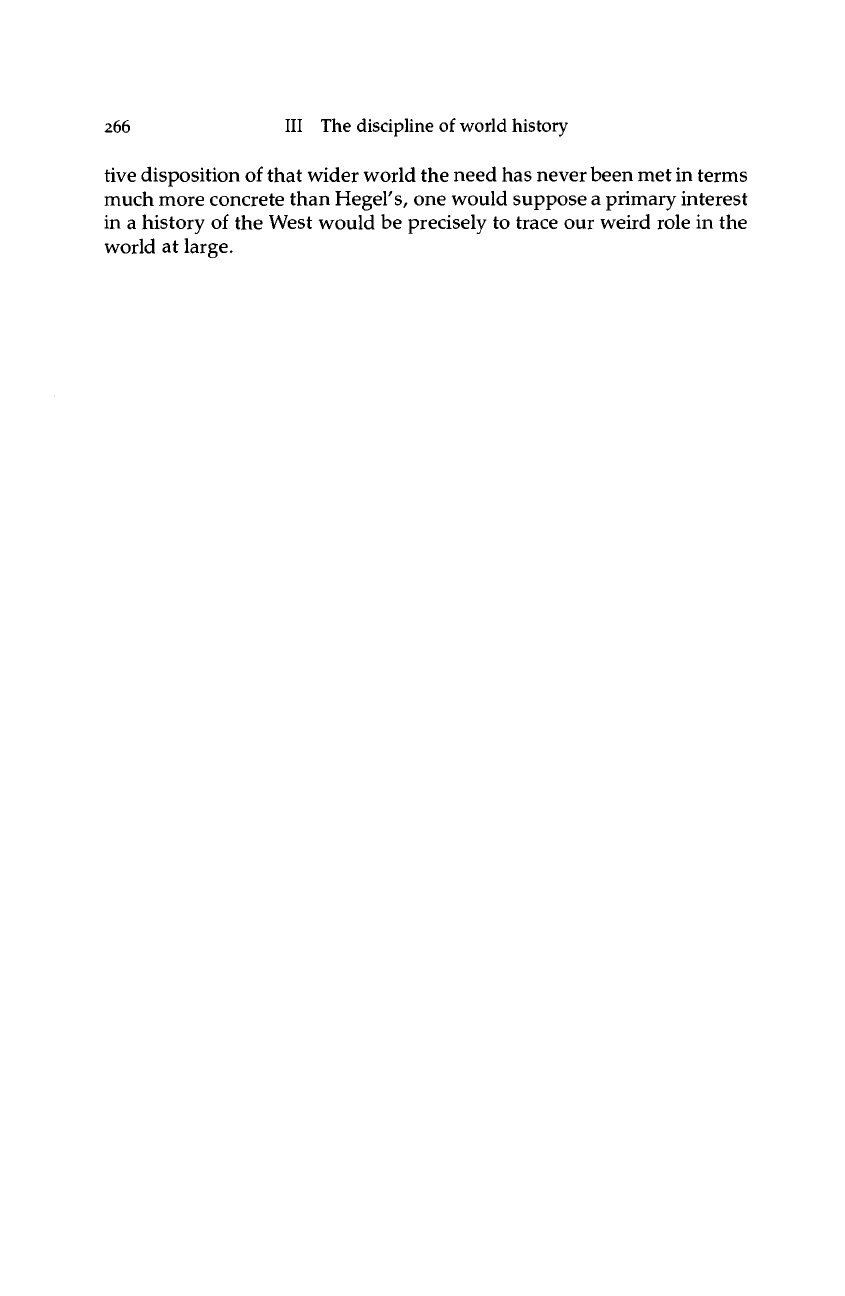
266 III The discipline of world history
tive disposition of that wider world the need has never been met in terms
much more concrete than Hegel's, one would suppose a primary interest
in a history of the West would be precisely to trace our weird role in the
world at large.
